Ridiculous/Hilarious/Terrible/Cool (4 page)
Read Ridiculous/Hilarious/Terrible/Cool Online
Authors: Elisha Cooper

Straddling the benches on
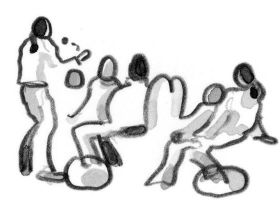 the other side of the atrium are the cool black students, wearing baggy hoodies and retro jerseys and baggy jeans (pulled up quick when security approaches). Next to them, the cool Latina students lie on benches in rolled-down sweatpants and designer jeans and tight white tank tops.
the other side of the atrium are the cool black students, wearing baggy hoodies and retro jerseys and baggy jeans (pulled up quick when security approaches). Next to them, the cool Latina students lie on benches in rolled-down sweatpants and designer jeans and tight white tank tops.

Some groups in the atrium segregate by interest: the arty girls who gather under the stairs, where they lie with their heads in their friends' laps and braid each other's hair and knit scarves; the smallish boys who circle the five Ping-Pong tables at the west end of the atrium; the dance girls who practice their routines against the lockers.
Some students don't belong to any group: the boy with the beard, the boy who is bald (not the same boy). The girl with the gap in her teeth an iPod Mini could slide through. The boy with the roller backpack who sits in front of the library, clipping articles out of newspapers and pasting them in a binder.
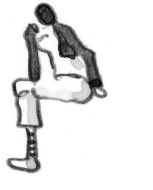
And then there are students who don't even belong to the school, seemingly floating above the rest of the student body. Like the pretty blond girl in the flippy skirt heading toward the front door in the middle of the day, the girl who makes all the boys' heads swivel.
Anthony Johnson Jr. sits in the cafeteria at a table full of girls. Everyone is laughing, and Anthony is laughing louder than everyone.
Anthony is a junior, an African American boy with bug eyes and a wispy mustache. He has a small head, which is now sticking out of the fuzzy collar of his large green winter jacket. The green jacket makes Anthony look like a turtle hauled up on a beach. Sometimes his head pokes out of his shell and he nibbles a french fry.
Notwithstanding Anthony's winter jacket, it's warm in the cafeteria. Not warm, really, but humid with pore-clogging
friedness
. There are five small windows with no view. Banners for colleges like Notre Dame, Northern Illinois, and Duke circle the top of the cafeteria walls (college is literally hanging over the students' heads). Around the fifty or so tables, students sit according to their race, eating chicken patties. While lunches are given names like
Incredibles,
no amount of wordplay can disguise what the food really is: not so edible.
friedness
. There are five small windows with no view. Banners for colleges like Notre Dame, Northern Illinois, and Duke circle the top of the cafeteria walls (college is literally hanging over the students' heads). Around the fifty or so tables, students sit according to their race, eating chicken patties. While lunches are given names like
Incredibles,
no amount of wordplay can disguise what the food really is: not so edible.
Consequently there are students who never come to the cafeteria. And then there are those like Anthony who never leave. He always sits in the same seat, back against the far wall. He likes this seat because he can keep everything in front of him. He can clown around, tell jokes, be loud, and “Ain't nobody behind you.”
Classes melt away, schoolwork melts away, things he should do but doesn't do melt away. The cafeteria is an island from the rest of school. An island full of girls.
One period later, Anthony is still here.
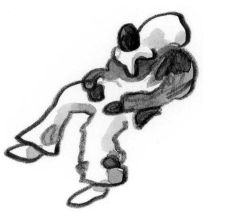
With the last bell, students pour out the front door: boys carrying skateboards, girls carrying cello cases, blind students tapping their canes, boys in form-fitting 16-Inch softball team uniforms, girls in striped knee-high socks, boys with do-rags under oversized hats, cheerleaders with pom-poms.
As different as the students are, they all do the same thing once they get outside. Ten feet from the door, they stop, take off their IDs and put them in their backpacks, and flip open a cell phone.
Today is Spirit Day. The girls from the cheerleaders and pom squad have gathered at the front of the school for a rally. As they kick their legs and shake their butts and shout into a megaphone, their cheers make it difficult for other students, as they head out the door with their hands over their ears, to hear their cell phone conversations.
We're headed to the top!
We're not hard to spot!
Walter Payton Grizzlies
Can't be stopped!
We're not hard to spot!
Walter Payton Grizzlies
Can't be stopped!
OCTOBER
Daniel Patton, senior class president, is waiting outside the guidance counselor's office. He's here for a meeting. He's absentmindedly flipping through a textbook, nodding at classmates who walk past. He says he is studying, though he is not.
“What's going on, Mister President?!” hoots a girl in snug jeans as she sashays past, flashing Daniel a brilliant smile. Daniel smiles back and nods.
What's going on is college applications. Daniel has been writing his personal statement, trying to represent his whole life in just a few lines. It's daunting.
Daniel has lived in the same house since he was a baby. He shares the second floor with his grandmother. His parents live downstairs. Daniel grew up doing normal kid stuff: hanging out, playing ball, running around the neighborhood until the streetlights came on. When he started grade school, his mother enrolled him in academic magnet schools, and soon the other kids in the neighborhood would point at Daniel and say
He's the smart kid
. As his education progressed, he was accepted by better and better public schools in the city, and began to leave his neighborhood behind.
He's the smart kid
. As his education progressed, he was accepted by better and better public schools in the city, and began to leave his neighborhood behind.
One of the few things that upsets Daniel is when people make the comment that he is articulate, as if that's surprising for someone who is black. He finds it patronizing. But, as a black student who has done well, Daniel also feels like a role model for his community. He feels roots to the neighborhood along with dreams of moving beyond it. Sometimes Daniel just wants to look after Daniel.
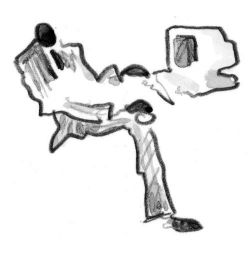
He has always been good at moving himself into favorable positions. During his freshman year at Payton, he made himself indispensable by working in the principal's office. He started talking with the guidance counselor about his college plans during his sophomore year.
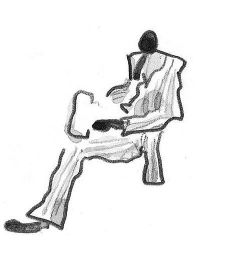
One of Daniel's essays mentions Illinois senator and rising political star Barack Obama. Obama is one of Daniel's heroes. Not only for his oratory and politics, but for his story. A young African American who went to Columbia and Harvard Law School. A young African American who used connections to get opportunities that led to better connections and more opportunities. To that end, Daniel has been trying to get his essay into the hands of someone he met who is a Harvard trustee, for some feedback.
If Daniel is accepted at Harvard he will attend Harvard. Some of Daniel's teachers say he can write his own ticket. He is also applying to Princeton, Yale, Penn, Duke, Northwestern, Carleton, Michigan, and the University of Illinois. He worries about Harvard's financial aid, though, and his parents would prefer that he go to a college where he would get a better deal.
“I'm not going to
not
go to Harvard just because I can't afford it,” he says, crossing his long fingers. “I'm an optimistic person.”
not
go to Harvard just because I can't afford it,” he says, crossing his long fingers. “I'm an optimistic person.”
Money is often on Daniel's mind. So he sells shoes.
Daniel works in the shoe department at the Nordstrom downtown, selling kids' shoes. Over the summer he sold about twenty-five thousand dollars worth of shoes. He works on commission. On a good day, if he sells a thousand dollars of shoes, that's a couple hundred dollars. Daniel won't sell enough shoes to pay his way through college, but the money helps with application fees, and his own shoes.
He is wearing black leather wingtips today, and a blue suit. He frequently dresses up for student council meetings, committee meetings, other functions. Last week Daniel bought a new jacket, and his class ring. He needs to sell more shoes.
“I have bad spending habits,” he says, a sheepish smile creeping over his face. But clothes, like connections, are an investment. If you're going to be the man, you need to look like the man. Looking the man, knowing the man,
being
the man: It's all part of the same package that will let Daniel make his dreams a reality.
being
the man: It's all part of the same package that will let Daniel make his dreams a reality.
The door opens, and the white-haired guidance counselor ushers Daniel inside with a smile and an open arm.
“Lizzie's in
everything,
” whispers a spectacled girl into her friend's shoulder. They're walking around the tables in the atrium that have been set up for the school fair, checking out which students have signed up for which club. As of fourth period, here are the numbers:
everything,
” whispers a spectacled girl into her friend's shoulder. They're walking around the tables in the atrium that have been set up for the school fair, checking out which students have signed up for which club. As of fourth period, here are the numbers:
Student Government: 14
Chess Club: 5
Gay Straight Alliance: 6
African American Club: 10
PLAYA (Payton Latin American Youth Alliance): 8
Asian American Club: 5
Movie Club: 12
Anime and Japanese Culture Club: 12
Payton Players Drama: 23
Animal Rights: 1
Model U.N.: 0
International Club: 25
Chess Club: 5
Gay Straight Alliance: 6
African American Club: 10
PLAYA (Payton Latin American Youth Alliance): 8
Asian American Club: 5
Movie Club: 12
Anime and Japanese Culture Club: 12
Payton Players Drama: 23
Animal Rights: 1
Model U.N.: 0
International Club: 25
The International Club's popularity may have something to do with its mission statement:
To enhance the ability to thwart a diverse culture from inhibiting you to complete an overwhelming understanding within this earthly environment while expanding a knowledge including a varied experience.
“What does
that
mean?” says the girl with the glasses.
that
mean?” says the girl with the glasses.
“No clue,” says her friend. “Let's sign up!”
Emily Harris, girls' soccer captain, has goals beyond soccer. She has goals for life. She's got it planned out. She's applying early to Yale. She will get in. After Yale she will work as a consultant, then attend business school at the University of Chicago. Then she will run a company.
Other books
A Murderous Yarn by Monica Ferris
Pilgermann by Russell Hoban
Vedra and Krimon the Twin Dragons by Adam Blade
Still a Bad Boy: A New Adult Romantic Suspense by Scott, Ada
Blazing the Trail by Deborah Cooke
Guarding His Heart by Serena Pettus
Under the Table Surprise by M.L. Patricks
The Art of Baking Blind by Sarah Vaughan
The Black Stallion's Filly by Walter Farley
Broken Survivor by Jennifer Labelle